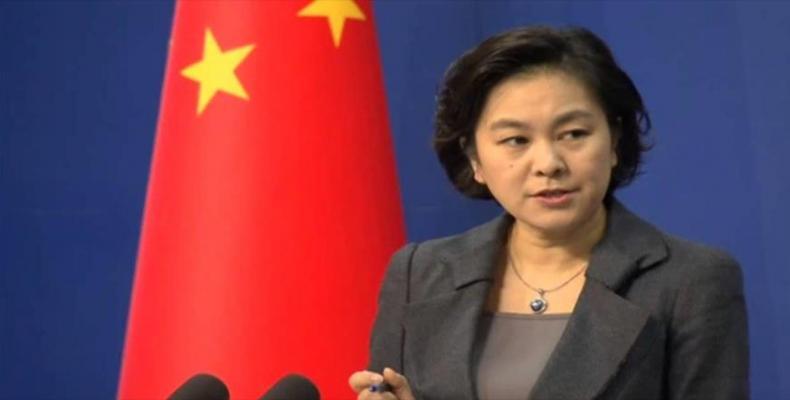Beijing, August 3 (RHC)-- China has expressed its “deep regrets” over the collapse of the Cold War era’s Intermediate-Range Nuclear Forces (INF) treaty between the United States and Russia, lambasting Washington for its pull out of the deal.
“Withdrawing from the INF is another negative move by the US, ignoring its own international commitment and resorting to unilateralism,” said Chinese Foreign Ministry spokeswoman Hua Chunying at a press briefing on Friday. She added that Washington’s real purpose was to drop limits on itself and seek unilateral military and strategic advantages.
The landmark treaty was signed in 1987 by the then-US President Ronald Reagan and Soviet leader Mikhail Gorbachev. It banned all land-based missiles with ranges of between 500 and 5,500 kilometers and included missiles carrying both nuclear and conventional warheads. The treaty, seen as a milestone in ending the Cold War arms race between the two superpowers, led to the elimination of 2,692 missiles from both sides, ridding Europe of land-based nuclear missiles.
However, Washington announced in early February that it would officially pull out of the deal in six months if Moscow did not stop testing ground-launched 9M729 cruise missiles. The U.S.-led NATO says the 9M729 missiles are launched from mobile batteries, making them hard to detect. Furthermore, they have a shorter warning time than long-range missiles, enabling them to potentially hit targets across Europe in a matter of minutes. The military alliance also claims that the missile can fly at ranges banned by the agreement - some 1,500 kilometers.
Russia rebutted the allegation in January by unveiling the missile and its key specifications, saying the maximum range of the missile, which NATO has named SSC-8, is 480 kilometers, thus it does not breach the INF. Moscow, for its part, is also critical of the US for its alleged violations of the treaty.
As Washington’s deadline for withdrawing from the agreement expired on Friday, Secretary of State Mike Pompeo announced in a statement earlier in day the U.S.’s complete and official pull out of the INF, falsely claiming “Russia to be in material breach of the treaty.” NATO has also rallied behind Washington, also blaming Moscow for the INF’s collapse and saying it hoped to avoid a new arms race.
Elsewhere in her remarks, Hua stressed that if the US resumed its research and deployment of the intermediate-range missiles after its withdrawal from the treaty, it would severely affect global strategic balance and stability, triggering aggravate tensions and distrust.
She added that the U.S.’s withdrawal from the treaty would also disrupt international nuclear disarmament and multilateral arms control processes, threatening peace and security in the region.
“We urge the U.S. to show restraint and not to take actions undermining other countries' security interests but to fulfill its responsibility as a major power and safeguard global and regional peace and security with the international community,” Hua further said.
She also called on the international community to be aware of the severe consequences of the US’s pull out of the INF and to prevent Washington from shaking off its responsibility in nuclear disarmament.
Separately on Friday, Russia’s Deputy Foreign Minister Sergey Ryabkov said in an interview with RT that “No one will gain” from the collapse of the INF. “Everyone’s security will be in jeopardy.”
“The only reason for this to happen was that the U.S. decided to untie itself from an arms control treaty that kept capabilities of the U.S. in this area at zero-level for decades,” he added. He also noted that Moscow had demonstrated its ability to find “cost-effective answers” to any military challenges it faces, thus if Washington intends to commence a new era of arms race, the effort is bound to backfire.
Earlier this year and in the wake of the U.S. suspension of the INF, Russian President Vladimir Putin said the Kremlin had also suspended its obligations under the Cold War-era nuclear pact in “a mirror response” to the U.S. actions.
In December last year, the Russian president said his country could easily develop and deploy land-based intermediate-range missiles if the US carried out its threat to withdraw from the landmark treaty. Putin said the U.S. had decided long ago to pull out of the treaty and was now looking for justifications by blaming Russia.
Moscow is set to deploy new missiles as Russia and the US are on the eve of officially pulling out of the landmark INF treaty, analysts say.
Additionally on Friday, France also expressed its regret over the collapse of INF, warning that its demise would increase the risk of instability in Europe. “France regrets that no solution could be found to uphold the Intermediate-Range Nuclear Forces (INF) treaty,” France’s Ministry for Europe and Foreign Affairs said in a statement on Friday.
The French ministry further said in its statement that the treaty “was a central element of the European security architecture and of strategic stability in Europe.” It also warned that the INF’s demise “increases the risk of instability in Europe and erodes the international arms control system.”


